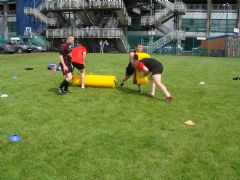Throughout my career as a
physiotherapist immersed in elite sport, I have worked in several contact
sports where head trauma is commonplace, including rugby, American football,
lacrosse & football. Others of the sports in which I have been involved, demonstrate a less common incidence of head injuries but of those that do occur, a high proportion are far more severe,
such as bobsleigh & Formula 1.
Indeed, during my career as a lacrosse
player, I suffered a couple of concussions including a severe incident in a
game versus Wales in the European Championships in 1996, which resulted in the
doctors diagnosing "brain bruising" & a fractured vertebra.
Subsequently, I have read the recent reports
relating early onset dementia to concussive incidents sustained whilst playing rugby,
with great interest. For those of you
that have yet to read the article published on the BBC website this week, a
neuropathophysiologist from Glasgow observed levels of abnormal proteins
associated with head injuries & dementia in a rugby player that were
significantly higher than in a retired boxer, diagnosed with dementia
pugilistica (commonly called "punch drunk syndrome").
Dementia pugilistica is reported to
affect around 20% of all boxers who endure long careers, with onset typically
presenting between 12 & 16 years after the start of the career. Symptoms are numerous but can include
compromised memory, coordination & speech capabilities, personality problems
in addition to tremors.
The causative factor is considered to
be repetitive concussive injuries & trauma to the head. As a result, a significant number of ice
hockey players & American footballers are also diagnosed with the disease
state. It is perhaps, therefore, not a
surprise that the case reported of a 50 year old former rugby player has come
to the fore. In my time working in rugby,
there were head injuries sustained by players in the majority of the games I
oversaw.
Whilst the reports are not calling for the laws surrounding the contact in sports like rugby to be changed, what the promotion of cases like these do highlight,
is that the management of these injuries in the acute phase & just as
importantly the subsequent return to training phase, is likely to have a
significant long term effect.
Dr. Willie Stewart, the pathologist
that reported the findings after examining the brain tissue sample taken from
the rugby player, supported the research suggesting that the consequences of sustaining a second
head injury before the brain has properly recovered from an initial concussive
episode, can be much more severe & result in more pronounced symptoms &
subsequent problems.
As expected, however, the research to
date is not yet sufficient to be able to provide an insight into the
epidemiology of the disease in this population of former rugby players, nor into how
many concussions are likely to predispose to the disease onset & in turn
how long after the concussions are sustained, the individual might be expected
to demonstrate symptoms.
What this research does, however, is to further highlight the seriousness of a concussive incident & underline the fact that under no circumstances should a player sustaining a head injury be encouraged, facilitated or condoned to return to the field of play in the immediate period following the injury, nor in the days following it, unless a full neurological assessment clears the individual as being fit to do so.
We have a duty as health professionals
working in sport to educate both players & non-medical staff alike, that
applying pressure to a player to return to early to action is not acceptable
& in actual fact, simply negligent.
During my time in Thailand, I have
witnessed wholly inappropriate action by team personnel, forcing players to
return to the pitch following a concussive episode. However, of even greater concern was the
support for this action by members of the medical team, far more preoccupied
with currying favour with the powers that be in the club, as opposed to
satisfying their professional obligations & responsibilities for the health
& safety of the players in their care.
Such instances simply underline the importance of disseminating the findings of the research that is out there, in addition to supporting the drive for still further research to be conducted both in acute management of concussive injuries, as well as the return to play protocols & the long term effects of these episodes.
To read more about Dr. Stewart's
findings & the opinions of members of the rugby fraternity, click on the
links below:
Rugby "linked to early onset dementia". BBC Scotland, 02.08.13
Beattie, J. (2013). Dementia research is "game-changer" for rugby. BBC Sport, 03.08.13
Doctors find link between dementia & playing rugby. Telegraph Sport, 03.08.13

